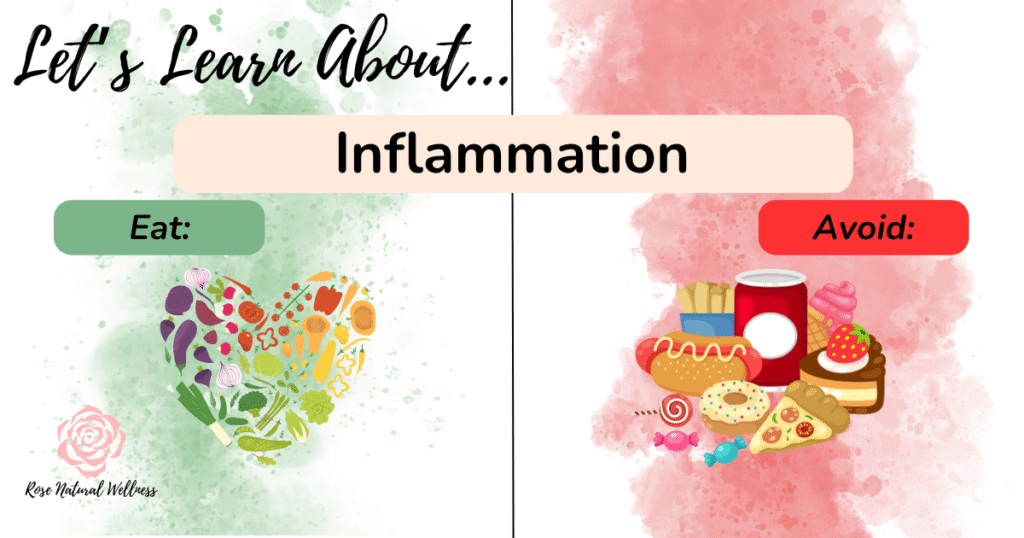
Inflammation is a word we hear often—but what does it actually mean for your health? More importantly, how does it affect women uniquely, and what role does nutrition play in calming the fire?
For many women, chronic inflammation is a silent contributor to fatigue, joint pain, hormone imbalance, gut issues, and even long-term risks like heart disease and autoimmune conditions. But here’s the good news: real, whole foods can be powerful allies in reducing systemic inflammation and supporting vibrant health.
Inflammation is your body’s natural immune response to injury, infection, or illness. It’s designed to protect and heal you. When you cut your finger or fight a virus, your body triggers inflammation—bringing white blood cells, warmth, and swelling to help you recover. That’s acute inflammation—and it’s a good thing.
But chronic inflammation is different.
When your immune system stays activated due to poor diet, stress, pollution, or gut imbalances, your body remains in a low-grade state of defense all the time. This can quietly damage tissues, disrupt hormone balance, cause your immune system to attach healthy cells and organs, and contribute to numerous diseases over time.
According to Harvard Health Publishing, this prolonged inflammation plays a role in the development of several major health conditions, including heart disease, type 2 diabetes, Alzheimer's, and autoimmune disorders. Chronic inflammation is now understood not just as a side effect, but as a key underlying factor that may trigger or worsen these diseases.
By understanding the difference between helpful acute inflammation and harmful chronic inflammation, you can start making daily choices that lower your risk and support long-term wellness.
Let’s break it down:
Chronic inflammation may not come with obvious symptoms right away, but over time it can lead to:
One of the biggest contributors to chronic inflammation? Your diet.
Women’s bodies are uniquely sensitive to the effects of chronic inflammation due to hormonal fluctuations, pregnancy, autoimmune predisposition, and stress load.
In fact, 80% of autoimmune disease patients are women (NIH source). Hormonal imbalances tied to estrogen, progesterone, and cortisol can be worsened by systemic inflammation—triggering issues like:
Chronic inflammation can also accelerate menopausal symptoms and increase risk for osteoporosis, especially when paired with poor nutrient absorption. Addressing it isn’t just about disease prevention—it’s about improving daily quality of life for the long-term.
The foods you eat act like information for your body—communicating with your cells, hormones, and immune system. Some foods soothe inflammation, while others silently provoke it. That’s why nutrition plays such a critical role in long-term health and healing, especially for women navigating hormone balance, fatigue, and chronic inflammatory conditions.
According to multiple peer-reviewed studies, anti-inflammatory diets rich in fruits, vegetables, whole grains, legumes, and healthy fats can significantly lower inflammatory markers like C-reactive protein (CRP) and interleukin-6 (IL-6).
Physician and researcher Dr. Michael Greger of NutritionFacts.org highlights that plant-strong diets—especially those high in antioxidants and phytonutrients—can reduce inflammation more effectively than some medications. In one randomized trial, participants who consumed more high-antioxidant foods (like berries and dark leafy greens) saw a 40% reduction in CRP, while those eating lower-antioxidant options actually experienced an increase in inflammation. You can see Dr. Greger's findings here.
Dr. Greger also shares findings from studies showing that turmeric (in whole spice form), daily intake of nuts, and whole grains, like oats, all exhibit natural anti-inflammatory effects by modulating key immune signals like IL-6 and TNF-alpha. Even small additions—like half a teaspoon of garlic or ginger daily—have been shown to lower inflammatory markers, according to this review.
The takeaway? Real, whole foods aren’t just fuel—they’re part of your body’s defense system. When chosen intentionally, they can help quiet chronic inflammation and support overall well-being, one meal at a time.
Here are some of our favorite powerful anti-inflammatory foods:
Now for the flip side. These foods are linked to higher levels of systemic inflammation—especially when consumed on a regular basis:
Aim to replace these with whole-food alternatives: roasted sweet potatoes instead of fries, sprouted grain toast instead of white bread, and olive oil or avocado oil instead of processed dressings.
Inflammation doesn’t have to rule your life—and you don’t need to overhaul everything overnight. The most powerful changes are sustainable ones. Remember, progress beats perfection.
By understanding the science of how systemic inflammation works, and supporting your body with real, nutrient-dense food, you can:
Nutrition isn’t just fuel—it’s medicine. And when it comes to inflammation, what’s on your plate matters more than you think.
If you’d like one-on-one, personalized guidance tailored to your needs and goals, schedule your free discovery call now! We will work together to reduce inflammation and build a nutrition plan that fits your body, lifestyle, and goals. Together, we’ll create a realistic plan that nourishes you from the inside out. Click the button below to schedule your free discovery call.